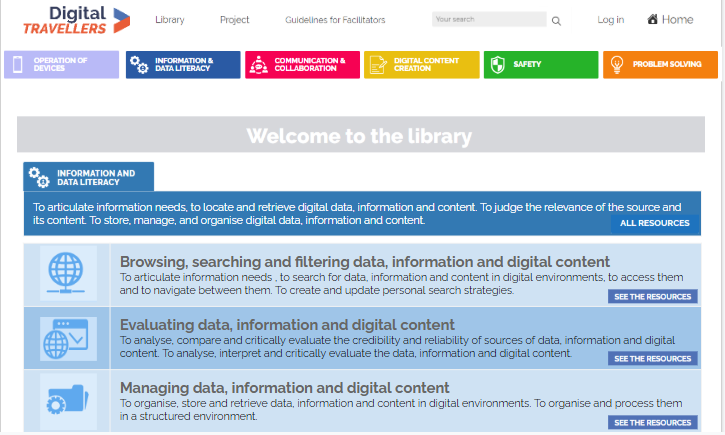Take a sneak peek into the Digital Travellers database!
23 July 2020
 In May, we mentioned that we had reached the first important milestone in our Digital Travellers journey, and had successfully mapped, under the leadership of the Dutch organization and project partner the KB, over 250 resources to help digitally excluded groups improve their skills!
In May, we mentioned that we had reached the first important milestone in our Digital Travellers journey, and had successfully mapped, under the leadership of the Dutch organization and project partner the KB, over 250 resources to help digitally excluded groups improve their skills!
This was the first step towards setting up the European Digital Travellers database which will be a one-stop shop for professionals in the field of non-formal education interested in supporting local communities in improving their basic digital skills.
This database and the library of resources it holds will be available in 2021, however, we are excited to give you a sneak peek into both now!
It all started with the mapping of resources currently used by all partners in their respective countries: Belgium, Finland, France, the Netherlands, and Poland. The mapping exercise, done in line with the European Union Digital Competency Framework, gave us a detailed characterization of teaching resources according to a number of common factors.
This allowed for resources to have a common base for comparison and eventual categorization within the database. Together, these resources form a diverse composite of teaching tools and support material that:
- Focus on a variety of groups ranging from children to the elderly with a focus on teenagers
- Boast different content types in multiple formats
- Cover a substantial range of topics
- Represent over four hundred hours of educational material dedicated to the upgrading of digital skills and competencies.
The majority of resources are internationally usable and the ones best suited to specific national contexts remain adaptable but will need a bit of creative thinking to use them successfully. In addition to worksheets, board games, online tutorial and webinars, a number of these tools will also provide guidance to facilitators on how to effectively organize a digital workshop. One of the underlying principles of our project is making available quality resources with as little constraint as possible which we have achieved by mapping resources mainly under Creative Commons licenses.
After completing the mapping exercise, our next step was to put these resources together to create an online library of digital education resources. As we have mapped quite a lot of material, we are being careful in how we design the database so that it is easy to navigate and appealing to professionals from different sectors.
All resources will be organised and displayed according to the European Union Digital Competency framework (DigComp 2.1). This framework groups 21 digital competencies under 5 headings, and identifies 8 proficiency levels (foundational, intermediate, advanced, and highly specialized), the first 3 of which are covered by our project. In order to serve as a springboard to the 5 other areas of competence, we have decided to add an additional competency area at the most basic level to include as a digital skill, ‘the operation of devices’ bringing the total number of headings to 6 which are:
- Operation of devices
- Information and Data Literacy
- Communication and Collaboration
- Digital Content Creation
- Safety
- Problem Solving
We have included search-filter options on both the home page and the library page to make the search for resources easy and intuitive. From here, users can narrow down the array of resources to the ones that are relevant for their needs at a particular time. Resources can be filtered according to age or target group, competency area, format, proficiency level and workload.
We will let you know when the database is ready to use and we hope that this library of resources will grow to become a point of reference for digital upskilling beyond the partner countries and will actively contribute to bridging the European digital divide.